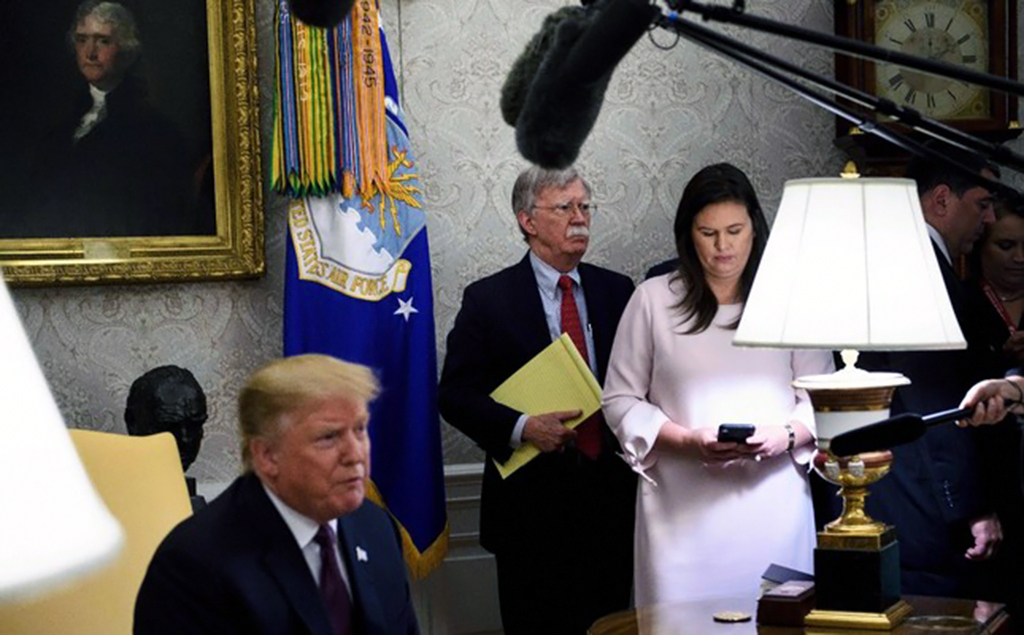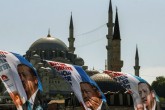The U.S. administration has been following a unilateral foreign policy approach not only for its adversaries but also for its allies on a global scale. However, while this policy for its adversaries in other parts of the world is mainly determined by American imperatives, U.S. President Donald Trump’s foreign policy toward adversaries in the Middle East is mainly influenced by American allies in the region, namely Israel, the United Arab Emirates (UAE) and Saudi Arabia. These three regional actors have strong and determined allies in the Trump administration such as White House Security Adviser John Bolton.
Iranian Foreign Minister Javad Zarif called this anti-Iranian group “Team B,” which includes Bolton, Israeli Prime Minister Benjamin Netanyahu, the Saudi Arabian Crown Prince Mohammed bin Salman and the Emirati Crown Prince Mohammed bin Zayed. It is widely claimed that this group together has laid down the main tenets of American policy in the region.The main objective of this concentrated and revisionist group is to establish a regional hegemonic system under the leadership of Israel, which will ensure the security and supremacy of the Israeli state, but also the stability of the authoritarian and despotic regimes of the region and the elimination of any adversarial regional actor.
Another objective of this hawkish coalition is punishing and limiting the regional influence of Iran. For this reason, they first persuaded Trump to withdraw from the nuclear deal signed by the Obama administration, together with the other permanent members of the U.N. Security Council and Iran. Signing the nuclear deal under the auspices of the U.N. Security Council legitimized Iran in international politics. Trump, who began to impose new sanctions on Iran and intensify anti-Iran policies, attempted to delegitimize Iran again and warned regional and global actors not to buy oil and natural gas from Iran in order to bring Iranian oil exports down to zero.
Israel, the UAE and Saudi Arabia have been forcing the Trump administration to punish Iran and have tried to escalate regional tensions at any price. The U.S. foreign policy toward the Middle East has been hijacked, that is to say bought, by these regional actors through payments to the American government, i.e. mainly with the sale of improved weapons worth of billions of dollars and payments to certain lobbies and individuals.
In the end, it is not a foreign policy based upon long-time rational calculations and national interests, but rather it is based on the short-term desire for public and private gains. That is, since President Trump and his team put U.S. policies on sale, he has achieved his goal of governing the U.S. like a private company.
The continuation of this conflictual American policy may bring high costs to the U.S. and the American public since the U.S. has to concentrate on many other crises and issues in other parts of the world such as the trade war with China, the Venezuelan crisis and increasing Russian effectiveness in Eastern Europe and the Eastern Mediterranean regions. Therefore, investing too much power in the Middle East may be questioned soon by the American political opposition and the general public, especially after some human and material losses.
[Daily Sabah, 15 May 2019]
In this article
- Opinion
- Benjamin Netanyahu
- CENTCOM
- China
- Crown Prince of the Emirate of Abu Dhabi
- DAESH
- Daily Sabah
- Deal of the Century
- Donald Trump
- East of the Euphrates
- Eastern Mediterranean
- Europe
- Fight against DAESH
- Foreign Minister
- Global Actors | Local Actors
- Islamic Republic of Iran
- Israel
- Israel-United Arab Emirates peace agreement | The Abraham Accord
- Kurdistan Workers' Party Terrorist Organization (PKK)
- Liquefied Natural Gas (LNG)
- Mediterranean
- Middle East
- Mohammed bin Salman (MBS)
- Mohammed bin Zayed Al Nahyan (MBZ)
- NATO
- NATO Ally
- Obama Administration
- Operation Euphrates Shield
- Opposition
- Palestine
- Peace Corridor
- People's Protection Units (YPG)
- PKK - YPG - SDF - PYD - YPJ - SDG - HBDH - HPG - KCK - PJAK - TAK - YBŞ
- Prime Minister
- Regional Power
- Russia
- Safe Zone
- Sanctions
- Syria
- Syrian Civil War
- Syrian Conflict
- Syrian Crisis
- Syrian Democratic Forces (SDF)
- Syrian National Army (SNA)
- Syrian National Coalition
- Syrian Opposition
- Syrian Refugees
- Terrorism
- Trade Wars
- Trump Administration
- Trump’s Syria Withdrawal
- Turkish Foreign Policy
- Turkish-American Relations
- Türkiye-US Relations
- Türkiye-US Security Relations
- Türkiye's Foreign Policy
- Türkiye's Operation Peace Spring
- Türkiye’s Operation Olive Branch
- U.N.
- United Arab Emirates (UAE)
- United Nations (UN)
- United Nations Security Council (UNSC)
- United States (US)
- US Foreign Policy
- US President
- US Withdrawal from Syria
- US-PKK/PYD/YPG/SDF Relations
- US-Terror Relations
- Vladimir Putin



